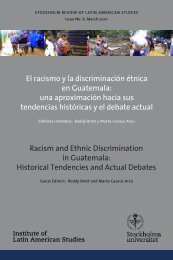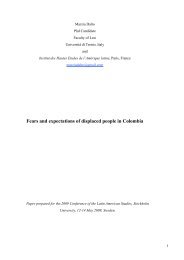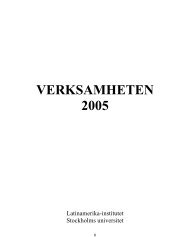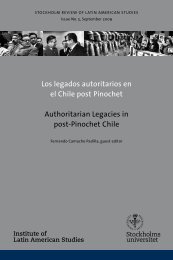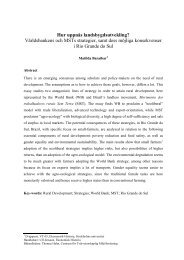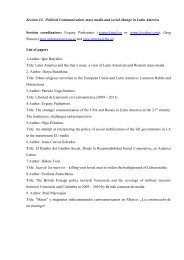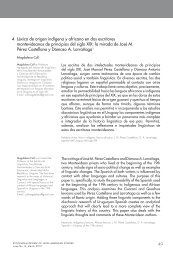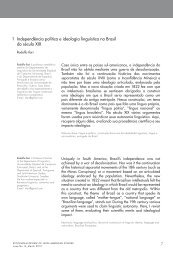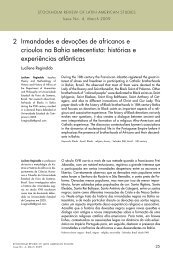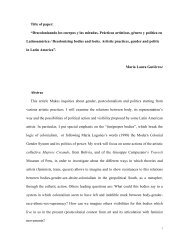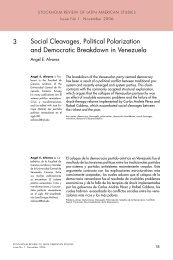Venezuelan Politics and Society in Times of Chavismo PolÃtica y ...
Venezuelan Politics and Society in Times of Chavismo PolÃtica y ...
Venezuelan Politics and Society in Times of Chavismo PolÃtica y ...
You also want an ePaper? Increase the reach of your titles
YUMPU automatically turns print PDFs into web optimized ePapers that Google loves.
Has <strong>Venezuelan</strong> Decentralization Sur vived <strong>Chavismo</strong><br />
Rickard O. Lal<strong>and</strong>er<br />
racazo riots <strong>in</strong> 1989 <strong>and</strong> the attempted coups d’état<br />
<strong>in</strong> 1992.<br />
The <strong>Venezuelan</strong> political society experienced<br />
a deepen<strong>in</strong>g crisis <strong>of</strong> party identification between<br />
1984 <strong>and</strong> 1994. The period follow<strong>in</strong>g 1989 also<br />
<strong>in</strong>dicates the preference for a new k<strong>in</strong>d <strong>of</strong> leadership,<br />
with anti-party leaders such as Hugo Chávez,<br />
a pattern that goes back to the post-colonial experiences<br />
<strong>and</strong> the caudillismo system. The popular<br />
disenchantment was also reflected <strong>in</strong> the local <strong>and</strong><br />
regional elections for governors <strong>and</strong> mayors. The<br />
changes related to decentralization <strong>and</strong> the open<strong>in</strong>g<br />
<strong>of</strong> the political gates to the State <strong>and</strong> the political<br />
system also contributed to the underm<strong>in</strong><strong>in</strong>g <strong>of</strong><br />
partyarchy. Decentralization <strong>in</strong> Venezuela affected<br />
political opportunities <strong>and</strong> open<strong>in</strong>gs for all political<br />
parties, but <strong>in</strong> different ways. For the traditionally<br />
super-centralized parties AD <strong>and</strong> COPEI, the changes<br />
<strong>in</strong> <strong>in</strong>ternal party structure had already begun <strong>in</strong><br />
the 1980’s with the development <strong>of</strong> neighborhood<br />
associations, which were flourish<strong>in</strong>g dur<strong>in</strong>g the<br />
decade <strong>and</strong> contributed to modifications <strong>of</strong> party<br />
st<strong>and</strong>s, especially with<strong>in</strong> AD. With<strong>in</strong> opposition<br />
parties, pressure for decentralization reforms accelerated<br />
dur<strong>in</strong>g the 1980’s. In the midst <strong>of</strong> this tense<br />
situation <strong>of</strong> constant conflict, the <strong>Venezuelan</strong> crisis<br />
did not start with, nor will it end with, Chávez. Ever<br />
s<strong>in</strong>ce the 1970’s a struggle for a deepen<strong>in</strong>g <strong>of</strong> democracy<br />
<strong>and</strong> a confrontation with the AD-COPEI partyarchy<br />
has been develop<strong>in</strong>g. Chávez was successful<br />
<strong>in</strong> capitaliz<strong>in</strong>g on the grow<strong>in</strong>g social <strong>and</strong> political<br />
discontent with the traditional political parties as<br />
he promised to get rid <strong>of</strong> the corrupt politicians <strong>and</strong><br />
the poverty-related problems <strong>of</strong> the nation. Chávez<br />
also promised a model <strong>of</strong> a more participatory democracy,<br />
with greater social <strong>in</strong>clusion.<br />
With a focus on decentralization, three ma<strong>in</strong> empirical<br />
periods can be discerned <strong>in</strong> <strong>Venezuelan</strong> democratic<br />
history s<strong>in</strong>ce 1958. First is the centralized<br />
party-State model concentrated <strong>in</strong> AD <strong>and</strong> COPEI,<br />
that is, partyarchy. Second is the process <strong>of</strong> decentralization<br />
<strong>and</strong> political pluralization between 1989<br />
<strong>and</strong> 1998. The third period is the Fifth Republic<br />
with the Chávez government s<strong>in</strong>ce 1999, <strong>in</strong> which<br />
traits <strong>of</strong> a re-centralization <strong>of</strong> political powers<br />
have been apparent. Nonetheless, even though the<br />
former COPEI-leader Rafael Caldera won <strong>in</strong> 1993<br />
<strong>and</strong> Chávez <strong>in</strong> 1998 <strong>and</strong> 2000, the strength <strong>of</strong> the<br />
advances <strong>of</strong> decentralization has been apparent <strong>in</strong><br />
the <strong>in</strong>ternal party structures <strong>and</strong> the party system as<br />
a whole. The victory <strong>of</strong> Caldera <strong>in</strong> the wake <strong>of</strong> the<br />
Caracazo 3 riots <strong>and</strong> the two coup attempts reflected<br />
the population’s dissatisfaction <strong>and</strong> its will to punish<br />
the politicians guilty <strong>of</strong> the crisis. This disenchantment<br />
<strong>and</strong> tendency towards vengeance on the<br />
part <strong>of</strong> the electorate merits even greater attention<br />
<strong>in</strong> the analyses <strong>of</strong> the triumphs <strong>of</strong> Chávez, which<br />
also need to take <strong>in</strong>to consideration the <strong>Venezuelan</strong><br />
populist <strong>and</strong> caudillismo traditions. Regard<strong>in</strong>g the<br />
position <strong>of</strong> Chávez on decentralization, he opposes<br />
the neo-liberal <strong>and</strong> bureaucratic duplication aspects<br />
<strong>of</strong> decentralization <strong>and</strong> centralist traits have been<br />
apparent dur<strong>in</strong>g his years <strong>in</strong> power.<br />
Decentralization, party system <strong>and</strong> chavismo<br />
It is not a secret to anybody that Chávez is the one<br />
who exercises absolute personal control over MVR<br />
(Rey, 2002: 19).<br />
A few aspects <strong>of</strong> this political-cultural change <strong>in</strong><br />
behavior on the part <strong>of</strong> the <strong>Venezuelan</strong> electorate<br />
are still worth remark<strong>in</strong>g on. Decentralization has<br />
contributed to possibilities <strong>of</strong> vote splitt<strong>in</strong>g <strong>and</strong> the<br />
electorate has learned to value persons or projects<br />
rather than political parties at all political-territorial<br />
levels. The appearance <strong>of</strong> the political movement<br />
around Hugo Chávez could at a first glance<br />
seem like a return to party control <strong>of</strong> the political<br />
system, consider<strong>in</strong>g the strength <strong>and</strong> more <strong>and</strong><br />
more dom<strong>in</strong>ant position <strong>of</strong> MVR between 1999<br />
<strong>and</strong> 2006. However, the victories <strong>of</strong> MVR on all<br />
political-territorial levels have more to do with<br />
3 Further, many academics, politicians <strong>and</strong> ord<strong>in</strong>ary citizens still<br />
ma<strong>in</strong>ta<strong>in</strong> that without fraudulent electoral behavior <strong>and</strong> sabotage,<br />
Causa R <strong>and</strong> its presidential c<strong>and</strong>idate Andrés Velásquez<br />
would have won <strong>in</strong> 1993. Causa R might have been the most<br />
popular party at the time, <strong>and</strong> the party enjoyed high media<br />
attention <strong>and</strong> coverage. Velásquez was recognized ma<strong>in</strong>ly for<br />
his merits as governor <strong>of</strong> the important state <strong>of</strong> Bolívar.<br />
Stockholm REVIEW OF Lat<strong>in</strong> American Studies<br />
Issue No 1. November 2006<br />
32



